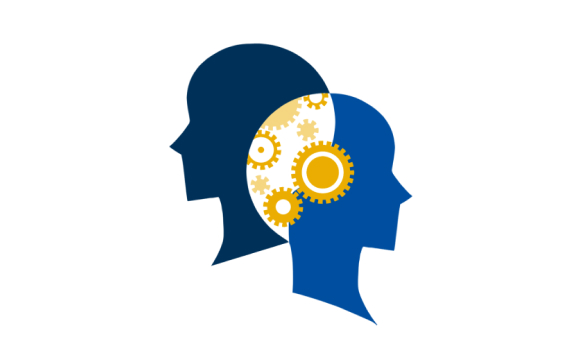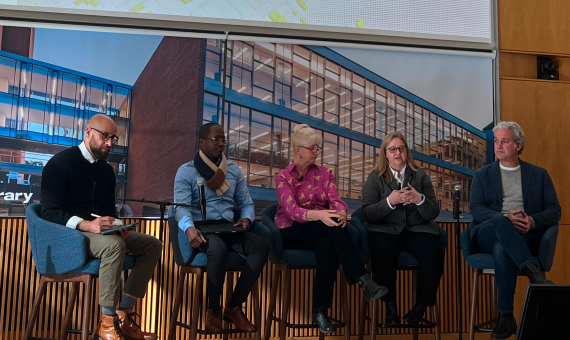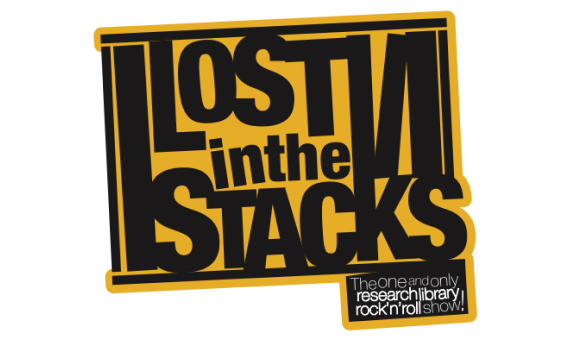pedagogy
Blurb / Gallery Set
The Georgia Tech Library's Empathy Bytes VIP (Vertically integrated Project) demonstrated their research with immersive environments as part of Media Arts Day in January of 2024. Faculty Advisor, Alison Valk and student Jack English provided an overview of the VIP course structure, technologies used, and a demonstration of a virtual library archives showcasing artifacts from the library's archives through extended reality. Learn more about the project here : https://tinyurl.com/Ebytes24
Media Arts Day is a celebration of new ways of learning and creating knowledge born from the intersection of arts and technology. It marries the Library’s reputation as a space for experimentation, connection, and communication with the School of Literature, Media and Communication’s work defining new models of intellectual inquiry and practice.
Charlie Bennett
The Georgia Tech Library's podcast Lost in the Stacks produced two radio specials based on work done in collaboration with the IMA. "What's on the Price Gilbert Windows?" was broadcast on February 16, 2024, featuring an interview with Tristan Al-Haddad, the Library's artist-in-residence, and his collaborator Gerry Chen, a robotics expert, recorded during Media Arts Day. "Creative Disorientation" was broadcast on October 13, 2023, featuring a conversation about technology-infused design and creativity with Stuart Romm, architect and College of Design professor, and artist Mark Wentzel.
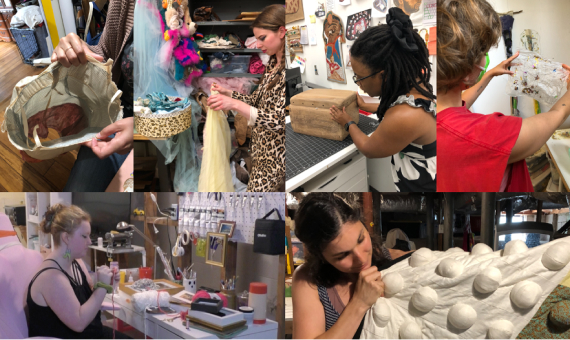
IMA: Craft and Community Building Studies
Alexandra Riggs
The Craft and Community Building Studies focus on learning about the intersections between craft and material processes, communities, and technology, as well as conducting ethical research with arts and craft-based communities. With this research, we study artists’ existing crafting and art-making processes and learn how they might use technologies or collaborations with technologists to influence their practices and community relationships. For the Interdisciplinary Media Arts Center, we specifically focus on how we can best reduce access barriers and facilitate collaboration between artists and researchers at Tech, while elevating individual artists’ practices and work. Additionally, the Craft and Community Building interviews have already led to expressive, transdisciplinary collaborations between artists interviewed and Georgia Tech researchers (e.g. a co-curated show between Tech and UGA and a co-making session between artists and Tech researchers.)
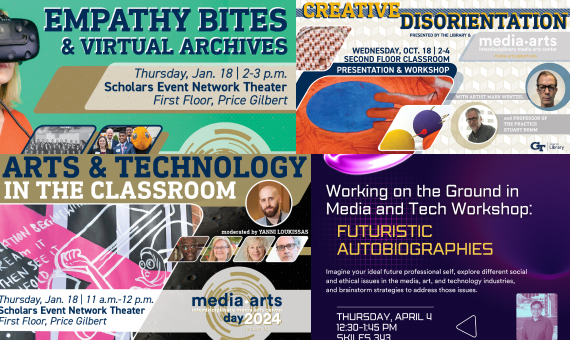
Artist/ Scholar/ Practitioner Seminar Talks
These talks allowed for chosen topics to be explored through the lens of multiple perspectives - From both the perspective of a scholar and a practicing artist. The format for both these events included a brief in-person panel discussion, and a workshop where theory and ideas were put into practice. Talk one: Creative Disorientation: Featuring Stuart Romm (architect) and Mark Wentzel (visual artist). Stuart and Mark discussed their areas of expertise, along with their creative process when bringing conceptual ideas to life. Attendees were invited to participate in a hands-on drawing workshop after the talk. Talk two: (RE)embodiment: featuring Frankie Mulinix (performance artist) and Melissa Foulger (instructor LMC and artistic director DramaTech) In a world of technology, connection to the body has become an increasing challenge. As technologists, it is important to remember to step away and stay connected with the original machine - our body - and appreciate its sensitivity, complexity, adaptability, and intelligence. Frankie Mulinix, artistic director of Burning Bones Physical Theatre, and Melissa Foulger, artistic director of DramaTech, led an open workshop on movement and embodiment. The following evening we had a panel about the challenges and opportunities associated with this kind of work.
LMC8803 Special Topics in Digital Media: Dara, Design, and Society
Spring 2023
Yanni Loukissas, Associate Professor of Digital Media
Charles Bennett, Public Engagement Librarian
Jason Wright, Library Communications Manager
What can data do to us? Can data enhance our senses, inspire wonder, invite curiosity, unsettle us, induce anxiety, or help us become more resilient? In this project-based graduate course in Digital Media, we used design as a form of inquiry to explore what data can do to us, not just for us. In recent years, the fields of data science (computing), data visualization (design) and data studies (humanities and social sciences) have focused on how data function instrumentally, as evidence. By this definition, data are rhetorical instruments. They exist to support the rational claims made by scientific, scholarly, commercial, and civic organizations. This perspective on data is important. However, it can overlook questions about how data work experientially, as perceptual and aesthetic artifacts. Indeed, data have an emotional impact, with social implications for what counts as data, where can data work, and who can make use of data. How data make us feel is at least as important to their effectiveness as the logical arguments they support.
Over the course of the term, students completed a series of design exercises culminating in a final, site-specific data visualization project for the Georgia Tech library's new "media bridge," a large-scale, exterior, high-resolution screen recently constructed on the central campus. In the process, they learned about how data can shape the way we feel about important local issues.
LMC6650 Project Studio: Walking in Mixed-Reality Wilds
Yanni Loukissas, Associate Professor of Digital Media
Charles Bennett, Public Engagement Librarian
This fall 2023 project studio addressed the question, How can we use data to augment our aesthetic experiences in nature, and to reshape our ethical attitudes towards the environment? Throughout the course, students explored how experiences and attitudes might be refracted through the lens of environmental, social, and cultural data. They learned a variety of methods for situated data representation, including visualization (data as graphics), sonification (data as sound), and physicalization (data as material). The course included introductory readings in areas such as environmental studies, information studies, and aesthetic theory. It also featured tutorials and case study work. However, our primary focus was on a series of hands (and feet) on exercises in data representation, as well as a lengthy final project to create mixed-reality walks in wild spaces around campus.

